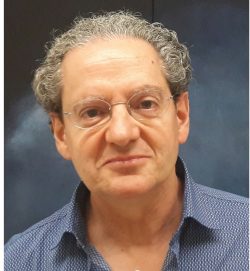

“I think Freire is already a classic author in the sense that you can agree or disagree with Freire, but you cannot ignore him, says professor Licínio C. Lima Photo credit: Shutterstock
Humanising the human – why Freire’s legacy still resonates across the world
Published:“I think Freire is already a classic author in the sense that you can agree or disagree with Freire, but you cannot ignore him, says professor Licínio C. Lima Photo credit: Shutterstock
A PhD student, education specialist and professor share how Paulo Freire has affected their thinking and approach to work.
Mario Molina, Colombia:
“When I started my education in Colombia in the 1980s, I did not hear that much about Paulo Freire – I think his popularity in Latin America had peaked a couple of decades before that.
At university, I ended up majoring in teaching English as a second language and then moved to the US for a couple of years to work as an English teacher. Now I teach English at the University of Los Andes back in Colombia and I’m studying for a PhD.
It was only about a year ago that I properly read Freire’s work and became fascinated. I felt Freire’s philosophy of education was vocalising and contextualising a lot of the ideas and principles I have been trying to realise in my own language teaching.
Thanks to Freire, I also believe that change is possible.
For example, here in Colombia the first language is Spanish, but English has an important status and can open many doors in society. Through my work, I can empower students to use the powerful tool that another language can be. However, I do not see my role merely as a professional transmitting my knowledge to my students. I also need to show my integrity and values.
For me, Freire is particularly interesting since he knew so well the problems affecting not just Brazil but Latin America in general. Poverty and social disparity are still the big issues in Colombia: the rich are very rich, and the poor are very poor.
Thanks to Freire, I also believe that change is possible. Traditionally, education in Colombia is very much a business and the best universities are only for the privileged few. I work at a prestigious private university and, for the first time, I also have students coming from lower socio-economic backgrounds. This is possible due to scholarships the government awards to those who cannot afford the tuition fees. I really want to show these kids that they are just as valuable, skilled and smart as my other students.
One thing I do not fully understand is the way Freire writes about the oppressed and the oppressor; sometimes I get a feeling he is blaming the oppressed for not standing up for their rights. Living in this world, I think it is obvious things are not that simple.
Mario Molina:
• PhD student at the Autonomous University of Barcelona
• English-language and pedagogy teacher at the University of Los Andes, Columbia

Nina Hjelt, Finland:
“I was a second- or third-year student of education when I read Pedagogy of the Oppressed for the first time. I was impressed by Freire’s message and his heart-rending, unwavering belief in the ultimate goodness of Man.
In other contexts, I have encountered the reasoning that no common endeavour can work because “Man is by nature selfish”.
I myself have never thought like that. I am grateful to Freire for revealing where selfish behaviour and greed stem from: from oppression and its related dehumanisation of human groups. This gives the impression that you can only be either a loser or a winner. It is rather that there are no winners in a game that rates people as unequal.
Another fundamental premise of Freire’s thinking is the equality of people. Traditionally, the pedagogical relationship is described as entailing a hierarchy between the teacher and learner. To Freire, teaching means surrendering to dialogue.
I digested this thought when I was young. How are learners supposed to be able to understand their own learning needs? Is the teacher not responsible for ensuring that the learners learn what they need in order to be able to manage in the system?
I have now been working for a few years with the ‘Life Skills for All’ teaching model. Its aim is to carry out the teaching of basic skills in a learner-centred way by resolving everyday challenges.
Freire’s thoughts about the equality and dialogue between the teacher and their learners have been important and effective in my work. They have increased commitment to learning. On the one hand, it is essential to recognise that everyone has their own knowledge and skills but, on the other hand, the competencies that we need change in relation to our environment.
When applied to the teaching of basic adult skills, learner-centredness, localness and the development of basic skills in action emerge as principles from Freire’s thinking. Localness means linking activity to the learner’s own physical and social environment. Basic skills are seen as being developed from solving problems emerging from the needs in learner’s own life.
One of Freire’s ideas important to me is that the learning of basic skills, for example reading, is seen as a right. If someone has not received the opportunity to learn skills that are important in their own living environment, that means that there is a lack of real opportunities, i.e. oppression.”
This text is an edited and translated excerpt from an essay originally published in in Finnish academic journal Aikuiskasvatus.
Nina Hjelt
• Specialist in Education/Project Manager at The Finnish Lifelong Learning Foundation
• Master of Education from the University of Helsinki
• Introduced the Citizens’ Curriculum model to Finland. Field of work encompasses basic skills, inclusion and eco-social education

Licínio C. Lima, Portugal:
“I am often called a Freirean expert, although I do not really feel I am. I think of myself more as a student of Freire; someone who keeps on trying to interpret Freire and combine his thoughts with my own academic interests.
Initially I studied to become a secondary school teacher but became fascinated with the idea of democratic education. Then I stumbled upon Freire’s book Pedagogy of the City. It is a collection of Freire’s interviews from the end of the 1980s when he was leading the Bureau of Education in São Paulo. In the book, Freire speaks about democratic management of schools and the meaning of community education in very practical terms.
I then decided to take a sabbatical to read and study all the books by Freire. This resulted in writing my own book, “School Organisation and Radical Democracy”. Before I knew it, I was accepted into the “Freirean” academic community and co-operating with international colleagues on various projects around Freire’s thoughts.
Freire reminds us that, from the moment we are born until we die, we are involved in learning.
Freire’s work gives us a radical perspective on education as the process of humanising humans. That is the basic thing about Freire. I think he is already a classic author in that sense – you can agree or disagree with Freire, but you cannot ignore him.
I think Freire’s critical approach to education is as relevant now as it ever was. He encourages us to ask why education is the way it is and what driving forces and power dynamics are behind it. These days, for example, there is much less talk about adult education and much more about lifelong learning, competences and upskilling. Learning is at the centre because everything is individualised. We are using the language of markets and economics more and more, and I worry that the critical, radical side of adult educations is being forgotten.
Freire reminds us that, from the moment we are born until we die, we are involved in learning, developing our thinking and changing through our encounters with others. Education alone does not have the power to change the world, but we cannot change the world without it.
Freire proposed democratic pedagogy based on participation and active citizenship. Now that we have populist and fascist regimes around the world, it is increasingly important to discuss what democracy means in everyday life.
We learn democracy through the practice of democracy; we learn how to participate through participatory activities. So, if you ask me, the crisis of democracy is also a crisis of education.”
Licínio C. Lima
• Professor of Social Sciences (Education) at the University of Minho, Portugal
• He has been a guest professor at various universities in Europe, Africa, Asia and Latin America
• Adult and permanent education from a Freirean perspective is one of his research and teaching topics

Author







